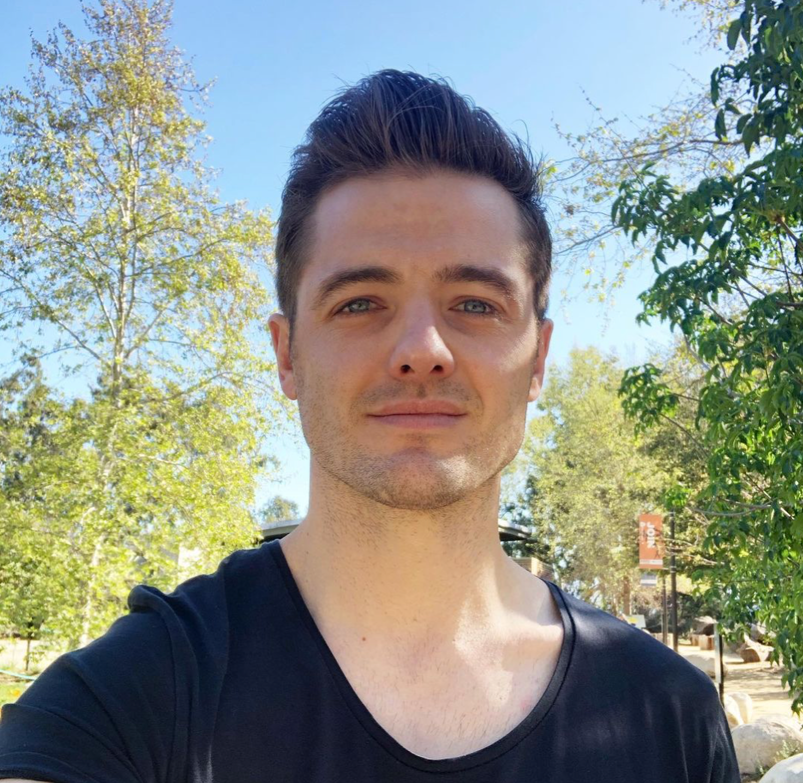
When many pro athletes retire, they often struggle to find their next passion. But thankfully, Robbie Rogers never encountered that problem.
The soccer great was approached with his first Hollywood project while he was still an active player, and quickly fell in love with the industry. His marriage with powerhouse producer/director/writer Greg Berlanti has only further enflamed his desire to work in show business.
While Rogers, 36, has dabbled in projects before, his most high-profile piece of work is about to hit the screen. The trailblazing soccer player co-wrote an episode of the scintillating Showtime drama Fellow Travelers, an epic love story that follows the forbidden romance between a charismatic wartime hero and government official (Hawkins “Hawk” Fuller, played by The Normal Heart‘s Matt Bomer) and idealistic recent college grad (Tim Laughlin, played by Bridgerton‘s Jonathan Bailey).
The series, which is based off Thomas Mallon’s 2007 novel of the same name, tracks the changing cultural attitudes around queerness from the Joe McCarthy era to the early 1980s. And sex is a significant part of the story.
As EW puts it, Fellow Travelers gives viewers “some of the most erotic depictions of same-sex sex ever put to screen on a premium television network.”
With that in mind, the show is a huge jump for Rogers, whose personal life is also at an apex. After permanently retiring in 2017, the Major League Soccer veteran married Berlanti and now fathers two children, both of whom are providing him with more purpose than he ever could’ve imagined.
Queerty recently caught up with Rogers to talk about his powerful relationship with Berlanti, the joys of fatherhood and the lessons he learned from working on such a groundbreaking drama. Here’s what he had to say…
QUEERTY: When you were playing soccer, did you think about getting into writing and producing? Or did all of that come layer?
Robbie Rogers: My first experience with producing was with Neil Marin and Craig Aiden. They came to me. I was playing with the Galaxy, and they wanted to do a comedy about a gay soccer player. So we eventually, like, you know, worked on that together. That was ABC, and we never actually made a pilot or anything, but I loved the experience offing creative and then pitching and trying to sell [the show] to a network. It felt a little bit like a game—I was very competitive. So that was the first experience that sparked my interest.
I’m from Los Angeles, so obviously living in LA, you’re always hearing about the industry. But I was very much focused on soccer from the time I was five, and didn’t really know what I was going to do next. So I was lucky that Craig and Neil. And obviously, I’ve learned a lot from Greg and everyone at Warner Brothers.
A lot of athletes talk about how they struggle to find a real passion when they’re done playing. Did you encounter that problem?
I didn’t necessarily experience those problems, but that definitely was a fear of mine. When I was really young, sometimes I’d be on a road trip somewhere, or on a bus from an airport to the hotel, and I’d be sitting with one of the guys later in their career, like in their 30s. And I’d ask him, like, “You’ve had an incredible career playing for the national team and doing all of this stuff. What are you going to do when you retire next year?” And sometimes they would be like, “I don’t know.” And that always scared me.
So from very early in my career, I had that concern in my head: “What am I going to do next?” Now, obviously, I was very focused on the games and the sports and winning and competing, but, you know, it is something I think a lot of athletes deal with.
But again, I was lucky that Craig and Neil approached me. I think the project was called Men in Shorts, or something. I found something that I was just as passionate about very early and quickly.
How has Greg encouraged you as a part of this process and transition?
He’s definitely supported me. As my husband, he used to come to all of my games, and I would say he was never worried about what I was gonna do next. He has so much faith and love and confidence in me. But I would also say, I learned a lot from him and the people who work for him and his production company. When I’m doubting a decision that we’re making, or having trouble articulating, I think it goes kind of both ways. There’s certain things that he’ll have me watch, and I’ll have him watch, and then we’ll discuss. We’re really lucky in that way. We really enjoy working with each other. But he’d be supportive if I did whatever.
You said in an interview that fatherhood is more rewarding than you ever could’ve imagined. I’m wondering if you could expand a little bit on that?
I didn’t know if I’d ever be a dad or find someone that I’d want to have a family with. And, you know, I think when you don’t have any of those things, and you don’t think it’s possible when you do have it, and when it is possible, you cherish it even more. I didn’t know I’d be so proud of how our kids, what little humans they’ve grown up to be. I’d say especially the last year or two, watching them grow up and watching Greg be a dad, I just have this overwhelming feeling or pride. I just feel very lucky and very proud to have a family and, you know, it does feel like an accomplishment because it’s a lot of work. It’s a lot of work to be a dad and to be a partner. But it’s so rewarding.
We know there are a lot of sanitized versions of queer stories. Obviously, Fellow Travelers is definitely not that. I’m curious why you think it’s important to tell queer stories with complex and layered characters?
Well, first, I think we deserve all of it. I think we deserve the bubblegum stuff, we deserve the rom-coms. There’s some really great shows out there and films like Heartstopper, or Love, Simon, or Red, White and Royal Blue. The list goes on and on. There’s just so many really incredible, diverse stories within the LGBTQ+ community.
I remember having those conversations with [creator] Ron [Nyswaner]. He’s like, “We’re very human and complex, and we don’t all agree with each other. In the ’50s, there were gay men that were supporters of McCarthy, and there were gay men that were communists, and then were gay men that didn’t give a f*ck. He wanted to make sure we told a story about, yes, these gay men that were in love, but also the human story, and that’s very complex. Every episode is filled with tension and decisions.
There are a fair amount of sex scenes in the show. As I’m sure you’re aware, there’s been a lot of conversation about sex scenes, and whether they’re necessary. In this case, why do you think the sex scenes are necessary, and how do they move the characters forward?
First of all, I don’t think sex scenes are necessary as a blanket statement. But for our story, there’s a lot of reasons why we wanted it to be as authentic as possible. And one of them is, this is a forbidden love story. And when the world outside hates you, and tells you that what you’re doing is disgusting, when you’re in those intimate moments in your apartment or your home, that love and can be filled with passion and lust. It can be aggressive. Like, you’re finally able to express yourself where you’ve been hiding amongst your family. It can really be passionate. So we wanted to make sure that we depicted that. And then also, a really important thing for Ron and for all the writers, is the power dynamics. It’s not just sex. It’s the give and take and push and pull. That’s important, especially in the ’50s, when it was so forbidden. And as Hawk maneuvers his way through politics, and he’s kind of like a fixer. I think he uses sex in a way to both release his frustration, but also get what he wants.
When working on this project, was there any part of gay or queer history that you were surprised to learn about?
I didn’t know what the Lavender Scare was! Then I researched and read even more about McCarthy. So I spiraled! I know this obviously isn’t a history lesson. It’s entertaining, and as you’ve seen, it’s a love story and a thriller. But I really love the historical elements. We had an incredible researcher in the writers’ room that created these timelines that I’ve saved on my desktop. There are so many parts of each episode that’s factual. We were really inspired in a lot of ways by real history and real people.
Fellow Travelers starts streaming on Paramount+ on Friday, October 27, before making its on-air debut on Showtime Sunday, October 29, at 9 pm ET/PT.



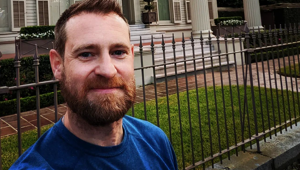
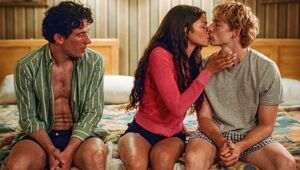



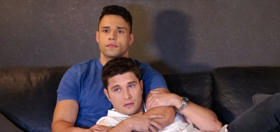









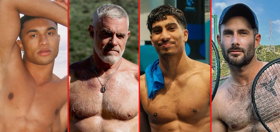
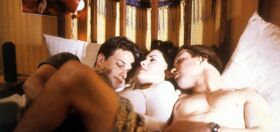
dbmcvey
Really beautiful family! Congrats to both of them!